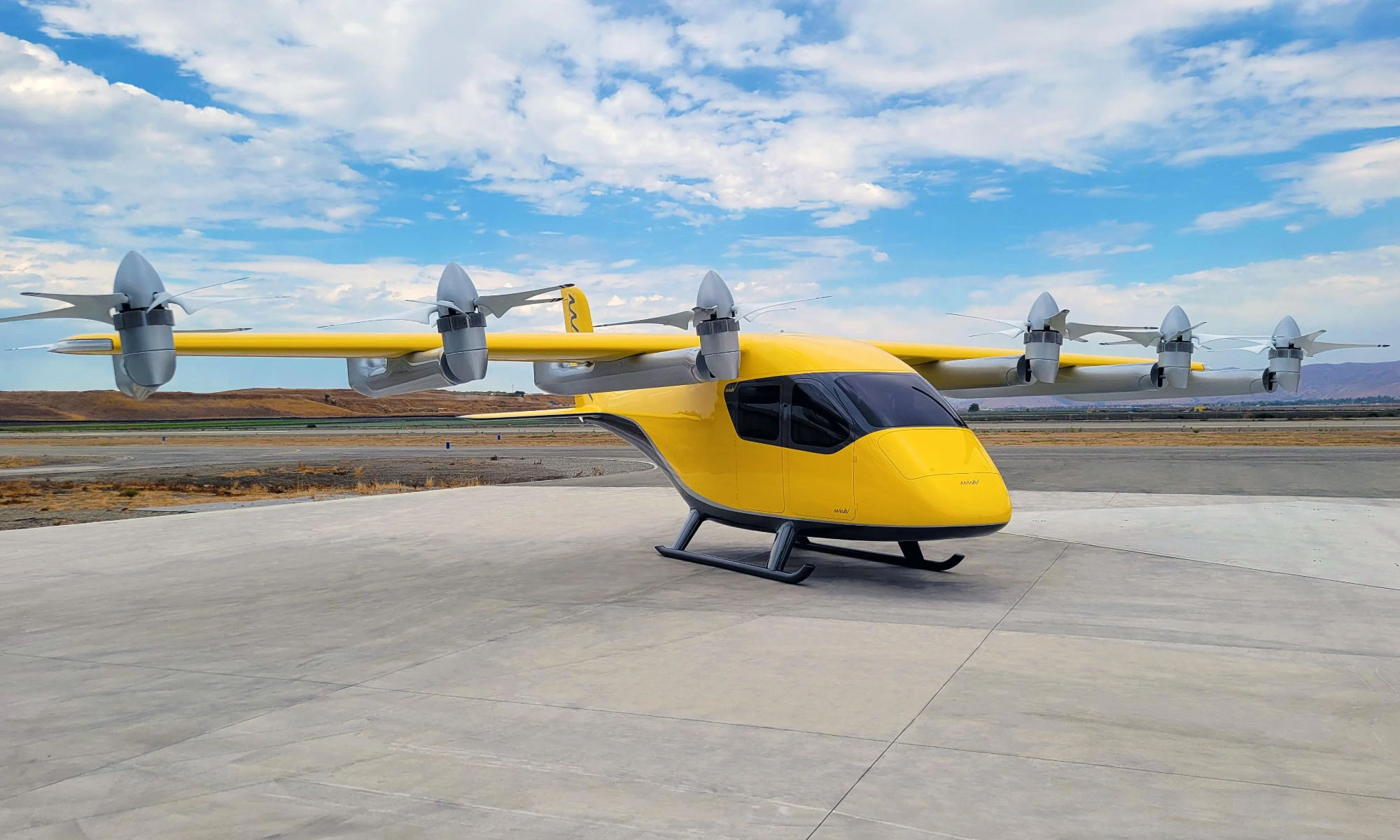News
Wisk Aero Unveils Four-Seat Autonomous Air Taxi
The Boeing-backed startup hopes that with FAA certification, it will soon be able to launch a viable air taxi service.

Wisk Aero may not yet be a household name, but the company has been around since 2019, and has just unveiled its 6th generation aircraft — a small electric 4-seat machine that can fly without any form of human intervention.
The company was originally a joint venture involving Boeing, and the now defunct flying taxi startup Kitty Hawk, initially funded by Google co-founder Larry Page. The Wisk plane is currently seeking FAA approval for passenger testing and will be the first ever electric vertical takeoff and landing (eVTOL) plane to receive certification.
Wisk’s latest design is unusual, featuring 6 five-bladed front rotors that can be tilted horizontally or vertically and the same arrangement at the rear (albeit two-bladed and fixed vertically). The plane has a cruising speed of 120 knots, combined with a 90-mile (140KM) range, and flies at a low altitude of 2.5 to 4 thousand feet.
So what does the future hold for Wisk’s autonomous air taxi? Eventually, the company hopes that clients will be able to hail the aircraft via a bespoke app, in a similar manner to an Uber. The plane will take off and land vertically, making it perfect for city applications, where it could easily launch and land from the rooftops of high-rise buildings.
Also Read: Airbus Has Revealed Its CityAirbus NextGen Flying Taxi
Weight remains a big issue for electric aircraft, due to the hefty mass of the batteries that need to be carried. Aviation fuel has a far better power-to-weight ratio than even the most modern lithium-ion batteries, so it remains tricky to make aircraft like Wisk’s viable. Wisk Aero has made encouraging progress so far and maintains the ambitious goal of carrying out 14 million taxi journeys in 20 global markets over the next five years.
News
Mamo Completes $3.4M Funding Round To Enhance Fintech Services
The startup will use the influx of cash to expand into Saudi Arabia and across the wider GCC while improving its product offering.

UAE-based fintech Mamo has announced the completion of a $3.4 million funding round that will help the startup extend its market presence and improve its product offering. Investors included 4DX Ventures, the Dubai Future District Fund and Cyfr Capital.
Mamo’s platform offers “payment collection, corporate cards and expense management” to help small and medium-sized businesses consolidate and streamline their operations. With the latest influx of capital, Mamo will further develop its comprehensive suite of services and begin testing its product lines in Saudi Arabia, further extending its footprint across the GCC.
Imad Gharazeddine, co-founder and CEO of Mamo, stated: “We’ve been in the market for a while now and are incredibly proud of what our team has achieved. The holistic and expansive nature of our product offering has helped us continue to grow sustainably. This additional funding will allow us to reach our medium-term goals even faster. The support from new and existing investors is a testament to our strong expertise and the ability to deliver on our customer promise”.
Daniel Marlo, General Partner of lead investor 4DX Ventures, added: “We have immense trust in Imad’s vision, leadership and Mamo’s innovative approach to provide a user-friendly and comprehensive financial solution for SMEs that makes financial management more accessible and efficient. We are proud to partner with them and support their mission”.
Also Read: A Guide To Digital Payment Methods In The Middle East
Amer Fatayer, Managing Director of Dubai Future District Fund’s investment team, also commented: “Mamo’s localized product lines serve as an infrastructure for SME payments and spend management in UAE, a segment that is underserved by the country’s current banking infrastructure. The team has taken a product-first approach to consolidating SMEs’ financial journeys and building a fintech solution deeply embedded in a business’s core operations”.
To date, Mamo has raised around $13 million in investment funding and now boasts a team of 30 people. The company’s intuitive financial services platform has allowed over 1,000 businesses to consolidate their financial operations and significantly reduce payment fees.
-

 News4 weeks ago
News4 weeks agoAmazon Prime Day 2024: Get Ready For 6 Days Of Amazing Deals
-

 News4 weeks ago
News4 weeks agoSamsung Unpacked 2024: What To Expect From The July 10 Event
-

 News4 weeks ago
News4 weeks agoCoursera Report Shows Surge In UAE Interest In AI Upskilling
-

 News4 weeks ago
News4 weeks agoMeet Dubai’s Groundbreaking Smart Robot Delivery Assistant
















